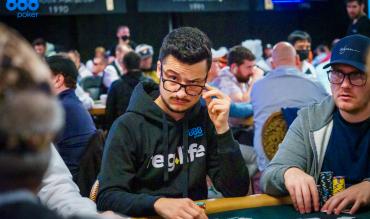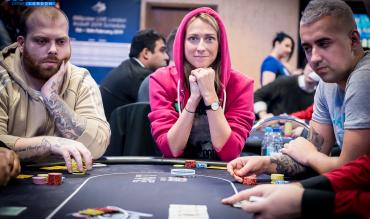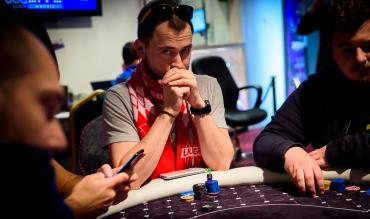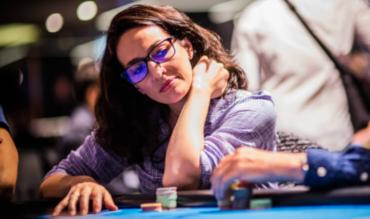Is it more critical to follow GTO or exploitative strategies when playing poker? The answer is simple:
You need both to be a winning player.
Today’s poker instruction primarily focuses on GTO (game theory optimal) strategies. But there is much to be gained from understanding our opponent’s psychology. If we don’t include psychological strategies in our arsenal, we leave money on the table.
Ever watched the movie Rounders (and if you haven’t, stop reading this right now and go watch it!)? You’ll remember that Matt Damon’s character Mike McDermott said of poker, “the key to the game is playing the man, not the cards.”
Let’s consider a more recent example where psychological factors appeared to be in play. The now infamous hand played out between Robbi Jade Lew and Garrett Adelstein on the Hustler Casino live-stream.
Playing the Player – Robbi vs Garrett
They were playing 100/200/400 & Garrett raised Robbi’s UTG $800 straddle to $3,000 from the big blind with 7♣8♣, and she called with J♣4♥.
- The flop was Tc9♣9♥, and he bet $2,500. Robbi called.
- The turn was the 3♥, and he bet $10,000. Robbi min-raised to $20,000
- Garret shoved all-in for $109,000.
- After some thought, she called.
They agreed to run it twice. Even though Adelstein was a slight favourite, he bricked both runouts. And she won a huge pot (which she eventually returned to Adelstein).
This hand led to a great deal of theorising about her thought process. There has been much discussion about whether anything untoward happened in the hand.
I read the man and make a hero call after he shoves on a turned brick card. Get over it.
— Robbi Jade Lew (@RobbiJadeLew) September 30, 2022
I’ll say it again like I’ve said it before: “I’m not playing nice in the sandbox anymore.”
Make it right @GmanPoker
Or don’t. #IDGAF
I’ve already moved on. I’ll make it back either way.
Robbi said something fascinating, indicating that psychological factors played a role in her decision to call.
On the stream, she can be heard saying: “It’s not about what I have; it’s what I think you don’t have.”
She also said: “You let me do this to you: You keep letting me.”
It is difficult to say what her exact reads were at the time. But it’s clear that she did not play the hand in a conventional way and in no way near optimal. Later she posted about the hand on Twitter.
She invited him to play heads-up so the “whole world can watch me read you all day.” If we take what she has said at face value, it is clear that she believes that psychology is an essential component of the game.
Opposition Player Analysis
| “If you know the enemy and know yourself, you need not fear the result of a hundred battles. If you know yourself, but not the enemy, for every victory gained, you will also suffer a defeat. If you know neither the enemy nor yourself, you will succumb in every battle.” -Sun Tzu, The Art of War. |
Suppose we follow the guidance of Sun Tzu. In that case, gaining knowledge of both us and our opponents is priority number one. Even Doyle Brunson agrees!
He is famous for saying, “Poker is war. People pretend it is a game.”

Winning players shows spend a great deal of time gathering information on their opponents’ hands and playing poker styles. You cannot make accurate inferences if you don’t have a baseline.
When you sit down at the table, your first job is to observe your opponents. Almost all players fall into predictable patterns of play. It’s your job to learn their tendencies.
- For example, take note of how they like to play draws.
- What do they tend to do with their strong hands? Weak hands? Bluffs?
- What are their tendencies from particular positions?
Players usually have go-to strategies. It is your job to figure out what those strategies are so you can exploit their predictability. What if you notice that a player is not predictable? Often this indicates that they are better than average. So, you should be cautious in your exploits and rely on a GTO strategy.
Don’t forget to observe your opponent’s mental state:
- Are they projecting nervousness, fear, tilt, anger, indecision, hesitation or frustration?
- How do they behave in a sub-optimal mental state?
- How does it affect their play (do they tighten up? Loosen up?)
Gain Experience and Build Your Mental Database
In poker, the ability to read your opponent typically increases with experience. The best players don’t have to consciously observe their opponents because they are so used to doing it. They will often say they just “knew” an opponent was going to take a specific action.
They might even call themselves “feel” players. The reality is that they are referring back to mental notes on their opponent’s actions, reactions, and tendencies from previous hands.

A classic psychological truism is that past behaviour is the best predictor of future behaviour. You can’t predict a player’s actions with 100% accuracy. But if you’ve seen them take similar lines in the past, they will likely do the same thing again.
- Always ask yourself: what is my experience with this opponent?
- Do they have any particular patterns I can capitalise on or exploit?
- Do their actions demonstrate a good grasp of the fundamentals?
- What is their general playstyle (tight, loose, aggressive, passive)?
- Do they play ABC, or is fancy play more their style?
- Do they have any peculiar lines or habits?
Please remember that it is easier to pick up on patterns and tendencies when we are mere observers and not active participants.
Doing so while actively playing is a skill that we must cultivate. It takes a great deal of composure, experience and competence to do it well.
The Role of GTO in the Psychology of the Game
You must understand optimal strategies in particular spots to maximise the game's psychological aspects. Understanding the most effective tactics gives insight into what a reasonably competent opponent might do with a specific range on a particular runout.
You can then weigh their actions against the optimal solution to see where they may have knowledge gaps that you can exploit.
- If you don’t see any areas ripe for exploitation, GTO should be your default.
- GTO should also be your default when you are outmatched.
If you find yourself in this spot in a cash game, ask for a table change ASAP. Otherwise, default to the most optimal line for the situation.

Psychology vs Solvers Conclusion
Understanding an opponent is an excellent way to determine when to deviate from an optimal strategy to exploit for bigger profits. The tricky part is that exploitation based on mental factors is a tricky endeavour. It takes a lot of practice. Even then, it’s not an exact science because humans are infinitely variable in their behaviours.
You can gain experience in this area if you practice thinking about what an opponent likely has in mind.
- For every move your opponent takes, ask yourself, what is the motivation behind this move?
- Is it likely that they are trying to trap me or to get me to respond in some particular way?
- What is the logic behind this move?
If you have trouble finding answers to these questions, think about it from your perspective. That is, what would I do if I were them? Approaching it from this angle can give you more insight.
You can gain a massive edge if you can understand and predict an opponent's future moves.


